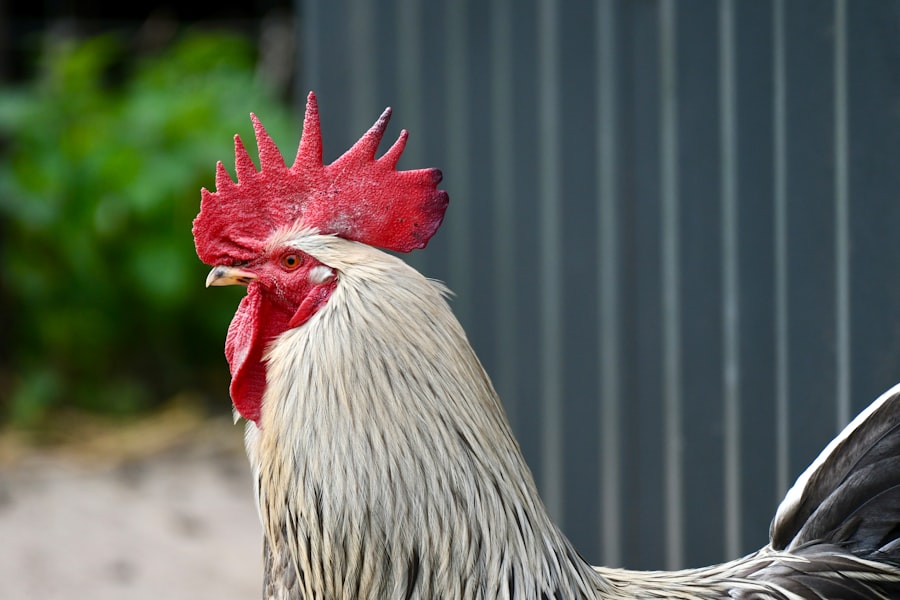Keeping guinea fowl in residential areas has become increasingly popular in recent years. These unique birds are known for their pest control abilities, distinctive calls, and low maintenance requirements, making them an attractive option for homeowners looking to add a touch of the exotic to their backyard. Guinea fowl are native to Africa and have been domesticated for thousands of years, with their striking appearance and quirky behavior making them a favorite among bird enthusiasts. While they may not be as common as chickens or ducks, guinea fowl can be a valuable addition to any residential property, providing both practical benefits and entertainment for their owners.
Key Takeaways
- Guinea fowl are a popular choice for pest control and entertainment in residential areas.
- Keeping guinea fowl can help control insect populations and provide natural alarm systems.
- Considerations for keeping guinea fowl include their loud calls, need for space, and potential for aggression.
- Guinea fowl require adequate housing and space to roam in residential areas.
- Feeding and caring for guinea fowl involves providing a balanced diet and monitoring their health.
Benefits of Keeping Guinea Fowl in Residential Areas
There are numerous benefits to keeping guinea fowl in residential areas, making them a valuable addition to any backyard or small farm. One of the primary advantages of guinea fowl is their natural pest control abilities. These birds are voracious insect eaters and will happily consume a wide variety of pests, including ticks, flies, and even small rodents. This can be particularly beneficial for homeowners who want to reduce the use of chemical pesticides on their property, as guinea fowl can help keep pest populations in check without the need for harmful chemicals. In addition to their pest control abilities, guinea fowl are also known for their distinctive calls, which can serve as a natural alarm system, alerting homeowners to the presence of intruders or predators. Their loud, high-pitched calls can be a deterrent to potential threats, making them an effective addition to any security system. Furthermore, guinea fowl are relatively low maintenance compared to other poultry, requiring minimal care and attention once they are established in their environment.
Considerations for Keeping Guinea Fowl in Residential Areas
While there are many benefits to keeping guinea fowl in residential areas, there are also several important considerations that potential owners should keep in mind. Guinea fowl are social birds and do best when kept in small flocks, so it’s important to consider the space requirements for these birds before bringing them into a residential setting. Additionally, guinea fowl are known for their loud calls, which can be disruptive to neighbors in close proximity. It’s important to consider the noise levels and potential impact on the surrounding community before introducing guinea fowl to a residential area. Another consideration is the potential for conflicts with other pets or wildlife in the area. Guinea fowl can be territorial and may not get along with other animals, so it’s important to carefully introduce them to any existing pets and monitor their interactions closely.
Housing and Space Requirements for Guinea Fowl in Residential Areas
When it comes to housing and space requirements for guinea fowl in residential areas, there are several key factors to consider. Guinea fowl are active birds that require plenty of space to roam and forage, so it’s important to provide them with a large outdoor area where they can exercise and explore. A secure coop or shelter is also essential to protect the birds from predators and provide them with a safe place to roost at night. The coop should be spacious enough to accommodate the size of the flock and provide adequate ventilation to prevent respiratory issues. Additionally, it’s important to provide nesting boxes or areas where the guinea fowl can lay their eggs and brood if they choose to do so. When designing a housing setup for guinea fowl in a residential area, it’s important to consider the potential impact on neighbors and the surrounding community. Ensuring that the coop is located away from neighboring properties and that noise levels are kept to a minimum can help mitigate any potential conflicts.
In terms of space requirements, guinea fowl generally require at least 3-4 square feet of space per bird in the coop, with additional space needed in the outdoor run area. It’s important to provide plenty of room for the birds to move around and engage in natural behaviors such as dust bathing and foraging. Providing a variety of perches, hiding spots, and enrichment activities can also help keep the birds stimulated and prevent boredom. When planning the layout of the outdoor area, it’s important to consider factors such as fencing, landscaping, and potential escape routes to ensure that the guinea fowl remain safe and contained within the property.
Feeding and Care for Guinea Fowl in Residential Areas
Feeding and care for guinea fowl in residential areas is relatively straightforward, as these birds are hardy and adaptable to a variety of environments. Guinea fowl are primarily ground foragers and will happily consume a wide range of insects, seeds, and vegetation as part of their natural diet. In addition to foraging, it’s important to provide a balanced commercial feed specifically formulated for guinea fowl to ensure that they receive all the essential nutrients they need to thrive. This feed can be supplemented with kitchen scraps, fruits, and vegetables to provide additional variety and nutrition.
In terms of care, guinea fowl require regular access to fresh water for drinking and bathing, as well as regular health checks to monitor for any signs of illness or injury. It’s important to provide regular dust bathing areas for the birds to help keep their feathers clean and free from parasites. Additionally, providing access to grit or coarse sand can help aid in digestion and prevent issues such as impacted crops. Overall, guinea fowl are relatively low maintenance compared to other poultry species, making them an attractive option for homeowners looking for a low-fuss addition to their backyard.
Noise and Behavior of Guinea Fowl in Residential Areas

One of the most notable aspects of keeping guinea fowl in residential areas is their distinctive noise and behavior. Guinea fowl are known for their loud calls, which can be quite disruptive in close quarters. Their calls are often described as sounding like “buckwheat” or “pot-rack,” and can carry over long distances. While some homeowners may find this noise charming or even useful as an alarm system, others may find it irritating or disruptive. It’s important to consider the potential impact on neighbors before introducing guinea fowl to a residential area and take steps to minimize noise levels where possible.
In addition to their calls, guinea fowl are also known for their quirky behavior and social dynamics. These birds are highly social and do best when kept in small flocks, so it’s important to provide them with plenty of opportunities for social interaction and enrichment. Guinea fowl are also known for their strong flock instincts and can be quite territorial, especially during breeding season. It’s important to monitor their behavior closely and provide plenty of space and resources to prevent conflicts within the flock.
Legal and Community Regulations for Keeping Guinea Fowl in Residential Areas
Before bringing guinea fowl into a residential area, it’s important to research and understand any legal and community regulations that may apply. Some municipalities have specific ordinances or zoning regulations that govern the keeping of poultry, including guinea fowl. These regulations may dictate factors such as minimum lot size requirements, setback distances from property lines, noise restrictions, and permit requirements. It’s important to familiarize yourself with these regulations and ensure that you are in compliance before bringing guinea fowl onto your property.
In addition to legal considerations, it’s also important to consider the potential impact on the surrounding community when keeping guinea fowl in a residential area. Communicating with neighbors about your plans to keep guinea fowl can help prevent conflicts and address any concerns they may have about noise or other potential issues. Being a responsible and considerate poultry owner can help foster positive relationships within the community and ensure that everyone can coexist harmoniously.
In conclusion, keeping guinea fowl in residential areas can be a rewarding experience for homeowners looking for natural pest control, unique entertainment, and low-maintenance poultry. By carefully considering housing and space requirements, feeding and care needs, noise and behavior considerations, and legal and community regulations, homeowners can successfully integrate guinea fowl into their residential environment while minimizing potential conflicts with neighbors or local regulations. With proper planning and consideration, guinea fowl can be a valuable addition to any residential property, providing both practical benefits and enjoyment for their owners.
Sure, here’s the paragraph with the related article included as an tag:
If you’re considering keeping guinea fowl in a residential area, it’s important to understand the specific requirements and considerations involved. In a recent article on PoultryWizard.com, “The Chicken Coop Country Diner,” the author explores the challenges and benefits of raising guinea fowl in a residential setting. The article provides valuable insights into creating a suitable environment for guinea fowl and offers practical tips for managing noise and space constraints. For more information on this topic, you can check out the article here.
FAQs
Can you keep guinea fowl in a residential area?
Yes, you can keep guinea fowl in a residential area as long as local ordinances and regulations allow for it. It’s important to check with your local government to ensure that keeping guinea fowl is permitted in your area.
Are guinea fowl noisy?
Guinea fowl are known for being noisy birds, especially when they feel threatened or are disturbed. They are also known to be loud when they are calling to each other. It’s important to consider the noise factor when keeping guinea fowl in a residential area.
What do guinea fowl eat?
Guinea fowl are omnivores and their diet consists of a variety of foods including insects, seeds, grains, and small reptiles. They are also known to forage for food on the ground, making them great for pest control in a residential area.
Do guinea fowl require a lot of space?
Guinea fowl do require some space to roam and forage, but they can adapt to smaller areas if necessary. It’s important to provide them with enough space to move around and forage for food, especially in a residential area.
Do guinea fowl require special housing?
Guinea fowl do not require elaborate housing, but they do need a sheltered area to roost at night and protection from predators. A simple coop or shelter with access to the outdoors is sufficient for keeping guinea fowl in a residential area.
Meet Walter, the feathered-friend fanatic of Florida! Nestled in the sunshine state, Walter struts through life with his feathered companions, clucking his way to happiness. With a coop that’s fancier than a five-star hotel, he’s the Don Juan of the chicken world. When he’s not teaching his hens to do the cha-cha, you’ll find him in a heated debate with his prized rooster, Sir Clucks-a-Lot. Walter’s poultry passion is no yolk; he’s the sunny-side-up guy you never knew you needed in your flock of friends!







